Production
Having completed the year-long sessions for Back to the Egg in April 1979, the five members of Wings began shooting music videos for the album with film company Keef & Co. [1] in June that year. [2] In addition to serving as promotional clips for their respective songs, the videos were to be compiled into a television special, [3] coinciding with Wings' UK tour late in 1979 [4] – the first leg of a planned world tour. [5] [6]
The production team hired by band leader Paul McCartney included Keith MacMillan, Phil Davey and Hugh Scott-Symonds. [2] According to author Keith Badman, MacMillan decided on the seven songs chosen for filming. [2] Among these were "Old Siam, Sir", "Getting Closer" and "Arrow Through Me" [3] – all tracks that would be issued as singles off Back to the Egg. [7] [8] The eighth selection in the TV special would be a clip for "Goodnight Tonight", a non-album single released in March 1979, [9] to coincide with the airing of the band's Wings Over the World TV film. [3] The "Goodnight Tonight" video was also produced by MacMillan's company [10] and dated from a 3 April shoot at London's Hammersmith Palais. [11]
Filming
Filming began on 4 June at Lympne Castle in Kent, [2] where Wings had recorded part of the album. [12] [nb 1] The video shot that day was for "Old Siam, Sir", [2] with filming taking place in the hall of the castle. [3]
On 5 June, the production relocated to the inside of an aircraft hangar, situated at a private airfield close to Lympne. [2] Here, the band filmed clips for "Spin It On" and "Getting Closer". [3] Invited to attend that day, Mark Williams of Melody Maker later wrote of drummer Steve Holly being "dolled up as a First World War fighter pilot", and commented on the aviation theme: "The Wings logo stands resplendent on the front of a hangar as some sort of loose visual pun; inside the crew are wrestling with draped parachutes and lighting gantries festooned above a sound stage." [15] During breaks in filming, Williams noted, the band gave impromptu live performances, "entertaining what appears to be half the population of East Kent, who wander in and out of aircraft hangars and fields of kale where the action takes place". [15]
Also on 5 June, the video for "Again and Again and Again" was shot in one of the nearby fields. [2] With the crew working late into the night, further scenes for "Getting Closer" included footage of a car driving on the airstrip. [2]
The production returned to Lympne Castle on 6 June, where Wings filmed the "Winter Rose/Love Awake" video. [2] Two days later, the band drove to Camber Sands in East Sussex, to shoot a clip for "Baby's Request", before heading to London for the upcoming Back to the Egg press launch. [2]
Filming resumed on 13 June, now at Keef & Co.'s London studios, where the band taped the video for "Arrow Through Me" and shot additional footage for "Getting Closer". [16] Film was also created for the opening and closing segments of the TV special, incorporating images from the album's cover artwork, [3] which was designed by Hipgnosis. [17]

"The Long and Winding Road" is a song by the English rock band the Beatles from their 1970 album Let It Be. It was written by Paul McCartney and credited to Lennon–McCartney. When issued as a single in May 1970, a month after the Beatles' break-up, it became the group's 20th and last number-one hit on the Billboard Hot 100 chart in the United States.
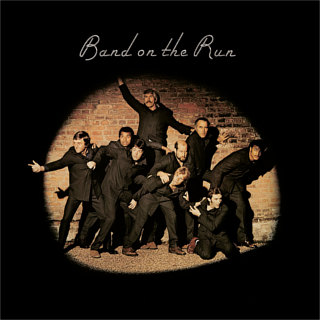
Band on the Run is the third studio album by the British–American rock band Paul McCartney and Wings, released in December 1973. It was McCartney's fifth album after leaving the Beatles in April 1970. Although sales were modest initially, its commercial performance was aided by two hit singles – "Jet" and "Band on the Run" – such that it became the top-selling studio album of 1974 in the United Kingdom and Australia, in addition to revitalising McCartney's critical standing. It remains McCartney's most successful album and the most celebrated of his post-Beatles works.
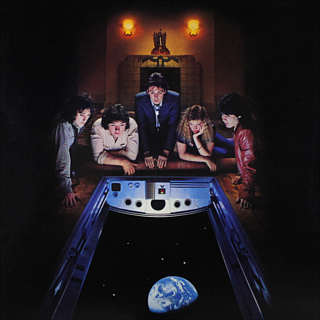
Back to the Egg is the seventh and final studio album by the British–American rock band Wings, released in June 1979 on Columbia Records in America, and on Parlophone in the UK. Co-produced by Chris Thomas, the album reflects band leader Paul McCartney's embracing of contemporary musical trends such as new wave and punk, and marked the arrival of new Wings members Laurence Juber and Steve Holley. Back to the Egg adopts a loose conceptual theme around the idea of a working band, and its creation coincided with a period of considerable activity for the group, which included making a return to touring and work on several television and film projects.

McCartney is the debut solo album by English musician Paul McCartney, released on 17 April 1970 by Apple Records. McCartney recorded it in secrecy, mostly using basic home-recording equipment at his house in St John's Wood. Mixing and some recording took place at professional London studios. In its loosely arranged performances, McCartney eschewed the polish of the Beatles' past records in favour of a lo-fi style. Apart from occasional contributions by his wife, Linda, McCartney performed the entire album alone by overdubbing on four-track tape.

Red Rose Speedway is the second studio album by the British–American rock band Wings, although credited to "Paul McCartney and Wings". The album was released by Apple Records in April 1973, preceded by its lead single, the ballad "My Love". By including McCartney's name in the artist credit, the single and album broke with the tradition of Wings' previous records. The change was made in the belief that the public's unfamiliarity with the band had been responsible for the weak commercial performance of the group's 1971 debut album Wild Life.
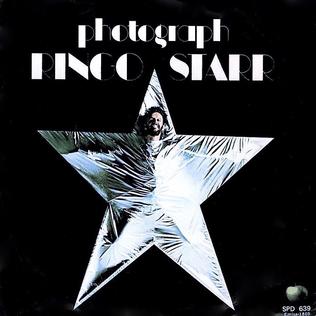
"Photograph" is a song by English rock musician Ringo Starr that was released as the lead single from his 1973 album Ringo. Starr co-wrote it with George Harrison, his former bandmate from the Beatles. Although they collaborated on other songs, it is the only one officially credited to the pair. A signature tune for Starr as a solo artist, "Photograph" was an international hit, topping singles charts in the United States, Canada and Australia, and receiving gold disc certification for US sales of 1 million. Music critics have similarly received the song favourably; Stephen Thomas Erlewine of AllMusic considers it to be "among the very best post-Beatles songs by any of the Fab Four".

"Give Ireland Back to the Irish" is the debut single by the British–American rock band Wings that was released in February 1972. It was written by Paul McCartney and his wife Linda in response to the events of Bloody Sunday, on 30 January that year, when British troops in Northern Ireland shot dead thirteen civil rights protestors. Keen to voice their outrage at the killings, Wings recorded the track two days later at Abbey Road Studios in London. It was the band's first song to include Northern Irish guitarist Henry McCullough.

"My Love" is a song by the British–American band Paul McCartney and Wings that was first released as the lead single from their 1973 album Red Rose Speedway. It was written by Paul McCartney as a love song to his wife and Wings bandmate Linda. The single marked the first time that McCartney's name appeared in the artist credit for a Wings record, after their previous releases had been credited to Wings alone. Released on 23 March 1973, the song topped the Billboard Hot 100 chart in the US for four weeks and peaked at number 9 on the UK Singles Chart. The single was viewed as Wings' first significant success in the US and helped Red Rose Speedway achieve commercial success.

"Back Off Boogaloo" is a song by English rock musician Ringo Starr that was released as a non-album single in March 1972. Starr's former Beatles bandmate George Harrison produced the recording and helped Starr write the song, although he remained uncredited as a co-writer until 2017. Recording took place in London shortly after the pair had appeared together at Harrison's Concert for Bangladesh shows in August 1971. The single was a follow-up to Starr's 1971 hit song "It Don't Come Easy" and continued his successful run as a solo artist. "Back Off Boogaloo" peaked at number 2 in Britain and Canada, and number 9 on America's Billboard Hot 100. It remains Starr's highest-charting single in the United Kingdom.
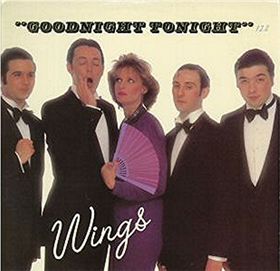
"Goodnight Tonight" is a song by the British–American rock band Wings. Written and produced by Paul McCartney, it was released as a non-album single on 23 March 1979 by Parlophone in the UK and Columbia Records in the US. It was recorded during the sessions for the band's 1979 album Back to the Egg and is notable for its disco-inflected sound and spirited flamenco guitar break.
"Sue Me, Sue You Blues" is a song written by English musician George Harrison, released on his 1973 album Living in the Material World. Harrison initially let American guitarist Jesse Ed Davis record it for the latter's Ululu album (1972), in gratitude to Davis for his participation in the Concert for Bangladesh. When writing the song, Harrison drew inspiration from the legal issues surrounding the Beatles during the early months of 1971, particularly the lawsuit that Paul McCartney initiated in an effort to dissolve the band's business partnership, Apple Corps.
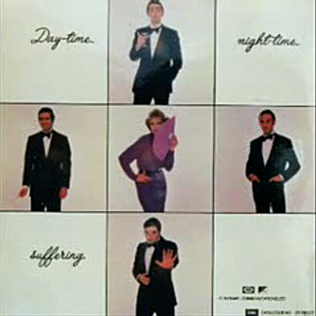
"Daytime Nighttime Suffering" is a song written by Paul McCartney and recorded by Wings. It was the B-side to the 1979 single "Goodnight Tonight," which was a top-five hit in both the UK and USA. It was released on CD in 1993 as part of the release of The Paul McCartney Collection, and can be found as a bonus track on the album Back to the Egg. It is also included on the CD collection Wingspan: Hits and History.
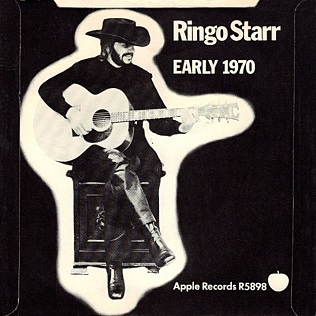
"Early 1970" is a song by English rock musician Ringo Starr that was released as the B-side of his April 1971 single "It Don't Come Easy". A rare example of Starr's songwriting at the time, it was inspired by the break-up of the Beatles and documents his relationship with his three former bandmates. The lyrics to the verses comment in turn on Paul McCartney, John Lennon and George Harrison as individuals, and the likelihood of each of them making music with Starr again. In the final verse, Starr offers a self-deprecating picture of his musical abilities and expresses the hope that all four will play together in the future. Commentators have variously described "Early 1970" as "a rough draft of a peace treaty" and "a disarming open letter" from Starr to Lennon, McCartney and Harrison.
"Sunshine Life for Me " is a song by English musician Ringo Starr from his 1973 album Ringo. It was written by George Harrison, Starr's former bandmate in the Beatles, and was one of several contributions Harrison made to Ringo. Recording for the song took place in Los Angeles in March 1973, with Richard Perry as producer. In addition to Starr and Harrison, the musicians on the track include Levon Helm, Robbie Robertson, Rick Danko and Garth Hudson of the Band, and multi-instrumentalist David Bromberg.

James Paul McCartney is the title of a 1973 television special produced by ATV and starring English musician Paul McCartney and his then current rock group Wings. It was first broadcast on 16 April 1973 in the United States on the ABC network, and was later broadcast in the United Kingdom on 10 May 1973. It was issued on DVD as part of the super-deluxe Red Rose Speedway box set in December 2018.

"Run of the Mill" is a song by English musician George Harrison, released on his 1970 triple album All Things Must Pass. Harrison wrote the song shortly after the Beatles' troubled Get Back sessions in early 1969, during a period when his growth as a songwriter had inadvertently contributed to the dysfunction within the Beatles' group dynamic. The lyrics reflect the toll that running their company Apple Corps had taken on relationships within the band, especially between Paul McCartney and the other three Beatles, as well as Harrison's dismay at John Lennon's emotional withdrawal from the band. Commentators recognise "Run of the Mill" as one of several Harrison compositions that provide an insight into events behind the Beatles' break-up, particularly the difficulties surrounding Apple.
Wings Over the World is a 1979 television documentary film featuring the rock band Wings. It consists of concert performances from their acclaimed 1975–76 world tour, together with behind-the-scenes footage. Also included is a short excerpt of Wings rehearsing at London's Institute of Contemporary Arts before their 1972 UK university tour. Problems with the audio from the 1976 live performances delayed the film's release until 16 March 1979 in the United States and 8 April 1979 in the United Kingdom, by which time, band members Jimmy McCulloch and Joe English had left the group and been replaced.
"See Yourself" is a song by English musician George Harrison, released on his 1976 album Thirty Three & 1/3. Harrison began writing the song in 1967, while he was a member of the Beatles, in response to the public outcry surrounding bandmate Paul McCartney's admission that he had taken the hallucinogenic drug LSD. McCartney's announcement created a reaction in the press similar to that caused in 1966 by John Lennon's statement that the Beatles were more popular than Christianity. In its finished form, the song's lyrics advocate self-awareness and consideration for the consequences of one's actions. Musically, the composition contains unusual shifts in time signature from standard 4/4 to 9/8, while the songwords reflect the era of its genesis by recalling themes first espoused in the Beatles tracks "Within You Without You" and "All You Need Is Love".
"Six O'Clock" is a song by English rock musician Ringo Starr from his 1973 album Ringo. It was written by Starr's former Beatles bandmate Paul McCartney and the latter's wife, Linda, who also participated in the recording of the song. It was the first time McCartney and Starr had worked together since the Beatles' break-up in 1970. Their collaboration reflected an easing of the tensions that had existed between the two musicians for much of that period.
A Salute to the Beatles: Once upon a Time is a 1975 television special about the English rock band the Beatles. It was presented and produced by English TV presenter David Frost for the American Broadcasting Company (ABC) network, and aired as one of Frost's Wide World of Entertainment specials, on 21 May 1975. The program documents the career of the Beatles from their popularity in Liverpool in the early 1960s, through the era of Beatlemania and unprecedented commercial success and cultural influence, to the band's demise amid the business problems surrounding their Apple Corps enterprise. The film includes archival footage and latter-day interviews with Beatles associates such as George Martin, Derek Taylor and Mal Evans. Commentary on the band's influence on popular music is provided by David Essex, Chuck Berry and Bobby Vinton.














